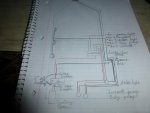brandon369
Cadet
- Joined
- Apr 12, 2014
- Messages
- 12
Hi guys, new boater here. I'm fixing up an older 14' Smokercraft I bought that was wired very poorly. I'm making a schematic off of the the generic boat diagram posted in the stickie. My question is how do I run the ground wires exactly? I'm confused because the switch/fuse panel I'm looking at appears to have a main ground wire on it, but I was thinking that all the ground wires connected to a ground bus bar and ran directly to the battery. Do i just leave the ground wire on the switch/panel alone and run all the ground wires to a ground bus bar and to the negative battery terminal? I included a picture of my schematic I'm working on. I tried to color code the wires. Dark blue for courtesy lights, gray for navigation lights, and brown for pumps. Thanks guys.






















